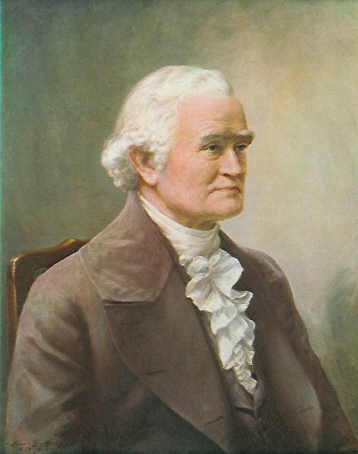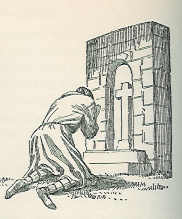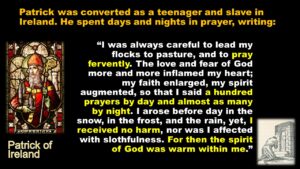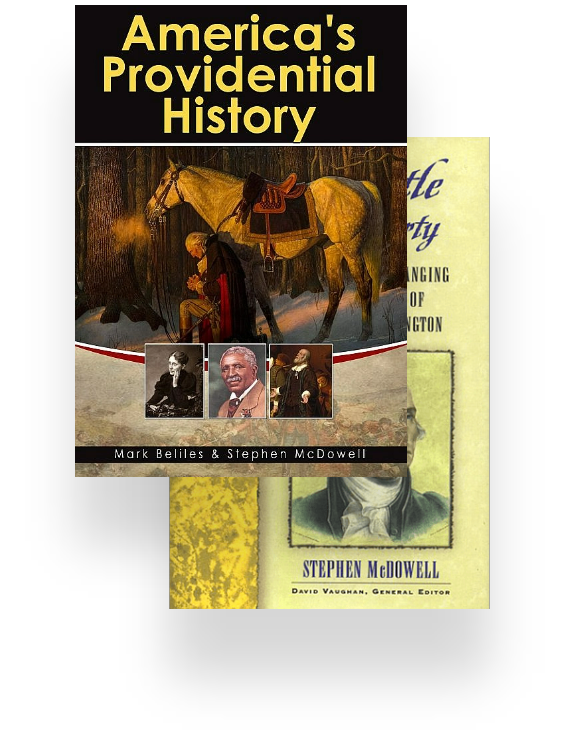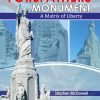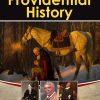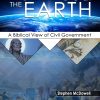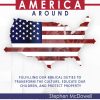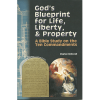The Christian Faith of George Washington
By Stephen McDowell
George Washington was much more than the Commanding General of the Continental Army and the first President of the United States. He was one of the most significant figures in world history; one of the greatest advancers of civil liberty of all time. Thomas Paine called him the “World’s Apostle of Liberty.” Washington’s Christian faith was key to his accomplishments and career. The following overview is from “Apostle of Liberty: The World-Changing Leadership of George Washington.”
During Washington’s lifetime, and for many years following, almost nobody would have doubted that he was a Christian. Bishop Meade wrote, “that Washington was regarded throughout America, both among our military and political men, as a sincere believer in Christianity, as then received among us, and a devout man, is as clear as any fact in our history.”1
In more recent years some have made other claims. In 1989 the Mount Vernon Ladies’ Association, the organization that maintains Mount Vernon, republished John Frederick Schroeder’s 1854 Maxims of Washington, which is a collection of Washington’s words on a variety of subjects. The quotes by Washington were basically the same, but the introductory remarks for each section were changed. Under Religious Maxims in the republished version, Washington is called a deist.2 In his original work, Schroeder gives quotes from contemporaries of Washington like John Marshall, who said, “He was a sincere believer in the Christian faith.”3 Some modern historians also make the claim that Washington was not a Christian but a deist.4 But the most prominent Washington biographers and compilers of his writings in the century and a half following his death, like John Marshall, Aaron Bancroft, Mason Weems, Washington Irving, Jared Sparks, David Ramsay, James Paulding, George Washington Parke Custis, Benson Lossing, and John C. Fitzpatrick all said he was a Christian, as did his family, 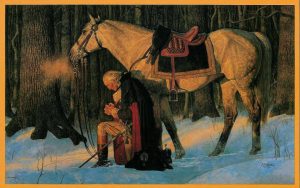
Why the difference in views? It’s not that more is known of his religious views today, but rather that those assessing his faith are mostly nonbelievers with a secular view of history, who deliberately underplay faith or don’t see faith as important in people’s lives.5 If they are Christian, they provide a shallow assessment of his faith or evaluate his faith in light of a modern perspective. Some, including some Christians, conclude he was a deist because he did not mention Jesus Christ, nor take communion, nor use modern evangelical language when writing about God, nor wrote a doctrinal position on what he believed. These items will be addressed more later, but Washington did write of Jesus Christ, even calling Him divine. He also took communion at various times in his life. His writings were filled with acknowledgments of God and his belief in Him; and his language was similar to that of many orthodox ministers in the Episcopal Church, of which he was a member.6
Washington did not put forth in his writings a set of personal doctrines, nor attempted to argue his particular Christian dogma, since, as he wrote, he was not a preacher. Failure to do so does not exclude someone from being a person of faith. Washington’s faith reflected the Anglican/Episcopal tradition of which he was a part. To the modern evangelical believer, that tradition would have some shortcomings. Yet, his writings show he had a deep knowledge of the Bible, and his actions indicate he embraced the Christian faith. He was raised in a Christian home, attended church throughout his life, spent much time in private and public prayer, issued orders where he promoted Christian living as essential, and had many testify he was a Christian. It rests upon those who claim he was not a Christian to prove so. Where is proof he was a deist? It cannot be seen in his writings or actions or testimonies of any who knew him.
There is no indication that he had a conversion experience, but this is the case of many raised in a Christian home. We may not know of a heart transformation, but his fruit and words and actions proclaim he was Christian. In fact, many ministers and others have written that the fruit exemplified in the life of Washington could have only been produced by the Christian faith.7 He also encouraged others toward the Christian faith throughout his life. The support for Washington’s Christian faith is so great it would take an entire book to present it, and in fact a number of such books have been published.8 Following is a brief overview of the evidence.
Testimony of His Family, Friends, and Acquaintances
The words of his family and friends offer the strongest support of his Christian faith, as they knew him most intimately. Chief Justice John Marshall was a personal friend of Washington’s and was chosen by Washington’s family to write his biography, in which he said: “Without making ostentatious professions of religion, he was a sincere believer in the Christian faith, and a truly devout man.”9 President of the Continental Congress during the Revolutionary War, Elias Boudinot, declared of Washington, “The General was a Christian.”10 Attorney Jonathan Mitchell Sewell said, “He was a firm believer in the Christian religion. . . . For my own part, I trust I shall never lose the impression made on my own mind in beholding — in this house of prayer — the venerable hero, the victorious leader of our hosts, bending in humble adoration to the God of armies and great Captain of our salvation!”11
Signer of the Constitution, Gunning Bedford, Jr., said of his friend Washington:
“To the character of hero and patriot, this good man added that of Christian. All his public communications breathe a pure spirit of piety, a resignation to the will of heaven and a firm reliance upon the providence of God. . . . Although the greatest man upon earth, he disdained not to humble himself before his God, and to trust in the mercies of Christ.”12
Nelly Custis, granddaughter of Martha, was adopted by the Washingtons and lived with them at Mount Vernon for twenty years. In a letter to Jared Sparks, a chaplain of Congress and the first compiler of Washington’s writings, she declared: “I should have thought it the greatest heresy to doubt his firm belief in Christianity. His life, his writings, prove that he was a Christian. . . . As well may we question his patriotism, his heroic, disinterested devotion to his country.”13
Ministers who knew him testified of his Christian faith as well. Rev. Henry Muhlenberg, founder of the Lutheran Church in America, after visiting Washington at Valley Forge said: “George Washington . . . respects God’s Word, believes in the atonement through Christ, and bears himself in humility and gentleness.”14 Rev. Devereux Jarratt, who pastored a church that Washington attended, said that “He [Washington] was a professor of Christianity and a member of the Protestant Episcopal Church.”15
Family and friends affirmed his consistent devotional life as well. His nephew and secretary, Robert Lewis, observed his private Bible devotions in the morning and evening, and believed he did such every day.16 Washington’s adopted son, George Washington Parke Custis, said he faithfully attended to the things of God, in public and private life. Rev. Lee Massey, who was Washington’s friend and pastor while he attended Pohick Church, said:
“I never knew so constant an attendant on church as Washington. And his behariour in the House of God, was ever so deeply reverential, that it produced the happiest effects on my congregation; and greatly assist me in my pulpit labours. No company ever withheld him from church. I have often been at Mount Vernon, on the Sabbath morning, when his breakfast table was filled with guests; but to him they furnished no pretext for neglecting his God, and losing the satisfaction of setting a good example. For instead of staying at home, out of false complaisance to them, he used constantly to invite them to accompany him.”17
As mentioned above, the early prominent biographers of Washington said he was a Christian. For example, Jared Sparks wrote of him, “A Christian in faith and practice, he was habitually devout.”18 “My conviction is, that he believed in the fundamental doctrines of Christianity as usually taught in that Church [the Episcopal Church], according to his understanding of them.”19 Aaron Bancroft wrote, “In principle and practice he was a Christian.”20
While President, Washington communicated with many different churches. His words to them show his great support for Christianity, and their words to him confirm his strong faith. The General Assembly of the Presbyterian Church in the U.S.A. sent a letter on May 26, 1789:
“We . . . esteem it a peculiar happiness to behold in our Chief Magistrate, a steady, uniform, avowed friend of the Christian religion; who has commenced his administration in rational and exalted sentiments of piety; and who, in his private conduct, adorns the doctrines of the gospel of Christ; and on the most public and solemn occasions, devoutly acknowledges the government of Divine Providence.”21
Christian Faith Reflected in Washington’s Personal Life
G.W.P. Custis said that “General Washington was always a strict and decorous observer of the sabbath. He invariably attended divine service once a day, when within reach of a place of worship.”22 Many times, bad weather or roads kept him from traveling the great distance to his home churches — he attended Pohick Church before the war, which was about 7 miles from Mount Vernon; after the war he attended Christ’s Church in Alexandria, about 10 miles away.23 Nelly Custis wrote: “General Washington had a pew in Pohick Church, and one in Christ Church at Alexandria. He was very instrumental in establishing Pohick Church. . . . He attended the church at Alexandria, when the weather and roads permitted a ride of ten miles.”24
He faithfully attended church and thought others should as well. In 1762 he rebuked his brother-in-law, Burwell Bassett, for not being at church and hearing the Gospel, writing on August 28:
“Dear Sir: I was favoured with your Epistle wrote on a certain 25th of July when you ought to have been at Church, praying as becomes every good Christian Man who has as much to answer for as you have; strange it is that you will be so blind to truth that the enlightning sounds of the Gospel cannot reach your Ear, nor no Examples awaken you to a sense of Goodness; could you but behold with what religious zeal I hye me to Church on every Lords day, it would do your heart good, and fill it I hope with equal fervency.”25
Washington went to a variety of churches whenever he was gone from his home. When he was in Philadelphia in the fall of 1774 as a delegate to the First Continental Congress he records going “to the Quaker meeting”, “St. Peters,” “to Christ Church,” “to the Presbeterian Meeting,” and “Romish Church.”26 While in the Boston area in 1775 and 1776, as commanding General, he found time to attend Rev. Nathaniel Appleton’s Congregational Church as well as Christ Church (Episcopal). One lady in attendance at Christ Church observed: “The General’s majestic figure bent reverently in prayer as with devout earnestness he entered into the service.”27 Throughout the war, he would attend services in the various towns where he set up his headquarters. For example, the two winters he spent in Morristown, New Jersey, he attended the Presbyterian Church, pastored by Doctor Timothy Johnes.28
Nelly Custis said that, while President, “in New York and Philadelphia he never omitted attendance at church in the morning, unless detained by indisposition. . . . No one in church attended to the services with more reverential respect.”29 His adopted son, George W.P. Custis, wrote of their living in Philadelphia: “On Sundays, unless the weather was uncommonly severe, the president and Mrs. Washington attended divine service at Christ Church; and in the evenings, the president read to Mrs. Washington, in her chamber, a sermon, or some portion from the sacred writings.”30 (He read sermons to his family when at home at Mount Vernon as well.31) When in New York they attended St. Paul’s church.
He not only attended church regularly, but for many years served on the vestry of two different parishes, Fairfax and Truro, which contained his two home churches, Pohick and Christ Church.32 An elected position, the people obviously considered him qualified to serve in this leadership role. His character was excellent and his belief was orthodox. Captain Dunham said, “He had embraced the tenets of the Episcopal Church; yet his charity . . . led him equally to respect every denomination of the followers of Jesus.”33 There is no reason to believe from his words or actions that he held to anything but Protestant orthodoxy. He did not, like a deist, have a generic, all inclusive set of tenets of faith. He certainly thought Roman Catholicism had errors — he wrote concerning Catholic Canadians that “a true Christian Spirit, will lead us to look with Compassion upon their Errors without insulting them.”34
Washington’s Christian faith is also evidenced by his many charitable contributions. Throughout his life he generously gave to many churches, Bible societies, and gospel works. He had a heart for those in need and supported the poor in many ways.35 His faith is most strongly expressed in his character, examined in the sections that follow. The Bible teaches that you will know Christians by the fruit in their lives, and Washington superbly displayed so many Christian qualities that many argued they could have only come from a life devoted to God.
The writings of George Washington reflect his intimate knowledge of God. He used at least 80 different names for “Jehovah, the Lord of Hosts,” which shows great insight into the nature of the “Divine Author of Our Blessed Religion.”36 Washington often used Biblical phrases in his writings, which reveal the depth of his knowledge of the Bible. In a Circular to the States (1782) he wrote “the race is not always to the swift, or the Battle to the strong.”37 He wrote to General and Mrs. Knox on the death of their child, “He that gave, you know, has the right to take way. His ways are wise — they are inscrutable — and irresistible.”38 In a reply to many clergymen he concluded, “that the future reward of good and faithful servants may be yours, I shall not cease to supplicate the Divine Author of life and felicity.”39 Concerning those people who were using the shortages of goods during the war for personal financial benefit at the expense of the starvation of the army and others, Washington wrote: “I would to God, that some one of the most atrocious in each State was hung in gibbets upon a gallows five times as high as the one prepared by Haman.”40 Writing to Lafayette during the war, he spoke of future peace: “after our swords and spears have given place to the ploughshare and pruining-hook.”41 After that peace he wrote again to Lafayette, “I am become a private citizen on the banks of the Potomac, and under the shadow of my own Vine and my own Fig-tree . . . I am solacing myself.”42 He liked the phrase “under my own Vine and fig tree,” as he used it often.43 He spoke of Pharaoh who “compelled the Children of Israel to Manufacture Bricks without the necessary Ingredients.”44 He referred to “the widow’s mite” in a letter to his adopted son.45 He referenced Ecclesiastes when he wrote to his adopted son regarding the importance of education: “The wise man, you know, has told us (and a more useful lesson never was taught) that there is a time for all things.”46
His knowledge of God was obtained from his parents, the church, and his own personal studies. He had over 150 different sermons and Christian books in his library at his death.47 One of the books in his library was a 24-page handwritten manuscript entitled The Daily Sacrifice. Some people have suggested that this work, which contains daily prayers with very explicit Christian content, was written by George Washington when he was a young man, though there is no direct evidence of this.48 Knowing the importance of Christian education, he gave Bibles and prayer books to Martha’s children and sent his grandson (adopted son) to be taught by ministers at Princeton and St. John’s Colleges.
Washington prayed, read the Bible, and had personal devotions throughout his life. His nephew, Robert Lewis, was his private secretary during the first part of his Presidency and lived with Washington for a time. Lewis said “he had accidentally witnessed his private devotions in his library both morning and evening; that on those occasions he had seen him in a kneeling posture with a Bible open before him, and that he believed such to have been his daily practice.” He also stated to Jared Sparks “that it was the President’s custom to go to his library in the morning at four o’clock, and that after his devotions, he usually spent time till breakfast in writing letters.”49 While living in Philadelphia as President, a young member of his household looked into his room after he retired for the night and “saw him upon his knees at a small table, with a candle and open Bible thereon.”50 Professor David Tappan of Harvard College said just after the death of Washington that “a near relative and intimate friend of Washington informs us, that he had his daily and regular hour of private devotion, from which no company, business, or amusement could divert him. We have similar assurances of his secret piety even amid the cares and temptations of military life.”51
Martha was also very regular in her devotions. Her grandson wrote that “after breakfast she retired for an hour to her chamber, which hour was spent in prayer and reading the Holy Scriptures, a practice that she never omitted during half a century of her varied life.”52
While Washington was generally reserved in expressing his faith, he did not neglect public prayers. He prayed for his family and his nation. Just prior to his step-daughter Martha Parke (Patsey) Custis’ sudden death at Mount Vernon, Washington, who was present, “knelt by her and prayed most fervently, most affectingly, for her recovery,” according to Nelly Custis, the niece of Patsey and daughter of Martha.53 He concluded his letter to the governors in 1783 with a prayer: “I now make it my earnest prayer, that God would have you and the State over which you preside, in his Holy protection.”54
He prayed at meals regularly. The artist Sharples who spent time at Mount Vernon painting his portrait said: “I observed that we never partook of food without the General offering grace to the Giver, so also at the close of every repast.55 He participated in special days of prayer. On June 1, 1774, Virginia observed a day of fasting, humiliation, and prayer, to show support for the people of Boston. In his diary for the day, Washington records: “Went to Church & fasted all day.”56 He observed similar days proclaimed by Congress throughout the Revolutionary War.
Washington was close friends with many devout Christians, like Governor Jonathan Trumbull of Connecticut and his son, Speaker of the House Jonathan Trumbull, who was the only non-family member allowed to visit Washington on Sunday afternoons while he was President.57 He respected and entertained many clergymen, and was also close friends with some, including Rev. Lee Massey, mentioned above, who pastored Pohick Church while Washington attended. G.W.P. Custis says that Rev. William White, the first American bishop in the Episcopal church, and Rev. John Carroll, the first bishop of the Roman Catholic church in the United States, were “among his bosom friends.”58 When Dr. Griffith, minister at Fairfax Parish, Alexandria, died in 1789, Dr. William Smith preached a sermon in which he states “he was near and dear” to Washington, “he was also his neighbour, and honoured and cherished by him as a pastor and friend.”59
Ministers and church bodies respected him greatly. Major William Jackson, aid-de-camp to Washington, said he was “beloved and admired by the holy ministers of religion.”60 The letters he received when first elected President from numerous denominations show the high regard the Christian community had for him.
Washington believed in the afterlife61 and was not afraid to die. When faced with a severe illness while President, he told his doctor, “I am not afraid to die, and therefore can bear the worst.” “Whether tonight or twenty years hence, makes no difference; I know that I am in the hands of a good Providence.”62 About ten years later he faced death calmly, saying “I am ready to go.” His Last Will and Testament begins, “In the name of God, Amen.”63
Washington’s Public Life Shows His Christian Faith
Although Washington was reserved in expressing his faith, one would not know it from all of his public actions. He carried on his personal devotional life wherever he was, whether at home at Mount Vernon, as President, and even in his field tent during wars. During the French and Indian War, an aid, Col. B. Temple, testified “that on sudden and unexpected visits into his (Washington’s) marquee, he has, more than once, found him on his knees at his devotions.”64 It was said of Washington, in a sketch written by an American gentleman in London in 1779 that “he regularly attends divine service in his tent every morning and evening, and seems very fervent in his prayers.”65 Washington also regularly prayed in public.
Washington said grace at public meals where no chaplain was present. An attendant at a State Dinner in May, 1789, said, “As there was no chaplain present, the President himself said a very short grace as he was sitting down.”66 The chaplain of Congress would dine with him once a month during his Presidency. Washington would ask him to prayer at such meals. At one such meal, likely forgetting that Chaplain Green was present, the President began to ask a blessing but after a few words, bowed to Dr. Green and requested him to proceed, which Green writes, “I accordingly did. I mention this because it shows that President Washington always asked a blessing himself, when a chaplain was not present.”67 Green also said that Washington “always, unless a clergyman was present at his own table, asked a blessing, in a standing posture. If a clergyman were present, he was requested both to ask a blessing and to return thanks after dinner.”68
Numerous days of Prayer and Thanksgiving, and Prayer and Fasting, were proclaimed by various governmental bodies during Washington’s lifetime. His habit was to diligently observe these days, at times attending public church services and at times participating with his troops in the field. In 1774 when the Virginia House of Burgesses observed a day of Prayer and Fasting, Washington records fasting all day.69 In the first section of this book a number of incidences were given where he observed days of prayer during the Revolutionary War. He and Martha attended services in Princeton College Chapel on October 31, 1783, in celebration of the Treaty of Peace, signed on September 3. In response to the recommendation by Congress for Americans to hold Thanksgiving services to mark the end of the war, he and Martha went to church in Philadelphia on December 11, 1783.70
Many prayers for people, leaders, and the nation came be found in his public writings. This was especially true during the war, from its beginning to the end. On July 4, 1775, just after assuming command of the army in Massachusetts, he ended his answer to an address of the Massachusetts Legislature “earnestly implor[ing] the divine Being, in whose hands are all human events,” to bring private and public happiness to them.71 In his Farewell Orders to the Army, on November 2, 1783, he offered “his prayers to the God of Armies” that “ample justice be done them here, and may the choicest of heaven’s favours, both here and hereafter, attend those who, under the devine auspices, have secured innumerable blessings for others.”72
While President he issued proclamations and observed them. According to Chaplain of the House of Representatives, Ashbel Green, “the proclamations which he issued for the purpose were probably written by himself,”73 in contrast to President Adams who had the chaplains write his proclamations. In October 1789 he issued a Proclamation for a Day of Prayer and Thanksgiving to be observed on November 26, which begins: “Whereas it is the duty of all nations to acknowledge the providence of Almighty God, to obey His will, to be grateful for His benefits, and humbly to implore His protection and favor.”74 Washington sought to do this throughout his life. He also believed the Christian nation of America should do so. But, even more than this, he believed that “all nations” should acknowledge God’s Providence and obey His will.
Knowing the importance of morality and religion for success in military endeavors, Washington issued orders to procure Chaplains during the Revolutionary War:
“The honourable Continental Congress having been pleased to allow a Chaplain to each Regiment, with the pay of thirty-three dollars and one-third per month, the Colonels or Commanding Officers of each Regiment are directed to procure Chaplains accordingly; persons of good character and exemplary lives; to see that all inferior officers and soldiers pay them a suitable respect, and attend carefully upon religious exercises. The blessing and protection of Heaven are at all times necessary, but especially so in times of publick distress and danger. The General hopes and trusts that every officer and man will endeavor so to live and act as becomes a Christian soldier defending the dearest rights and liberties of his country.”75
Washington encouraged his troops to seek God and live like Christians. He ordered them to attend divine service, to observe days of prayer and thanksgiving, and to act like Christians. Rev. William Emerson, a chaplain in the army, wrote a few days after Washington took command of the Army in Massachusetts, that new orders were read to the regiments “every morning after prayers.”76 On March 6, 1776, Washington ordered the troops to observe a day of fasting, prayer, and humiliation set aside by the State Legislature;77 and he reminded the soldiers at Valley Forge, “To the distinguished character of a Patriot, it should be our highest glory to add the more distinguished character of a Christian.”78 He issued orders against “profane cursing and swearing,” saying “that we can have little hopes of the blessings of Heaven on our Arms, if we insult it by our impiety, and folly; added to this, it is a vice so mean and law, without any temptation, that every man of sense, and character, detests and despises it.79 The General also issued orders prohibiting gambling80 and drunkenness.81
As already mentioned, Washington observed the Sabbath throughout his life. He encouraged his troops to do so as well by having the chaplains perform regular Sunday services and not scheduling exercises on that day if at all possible. His General Orders of March 22, 1783 state:
“In justice to the zeal and ability of the Chaplains, as well as to his own feelings, the Commander in chief thinks it a duty to declare the regularity and decorum with which divine service is now performed every Sunday, will reflect great credit on the army in general, tend to improve the morals, and at the same time, to increase the happiness of the soldiery, and must afford the most pure and rational entertainment for every serious and well disposed mind.”
“No fatigue except on extra occasions, nor General review or inspections to be permitted on the Sabbath day.”82
If no chaplains were present, he would at times conduct services himself. When General Braddock was shot at the battle of the Monongahela and died a few days later on July 14, 1755, “Washington read the impressive funeral services of the Anglican church, over his body,” which was then “buried in the road, so that the Indians might not discover and desecrate his grave.”83 In the years that followed, as he continued to be engaged in the French and Indian War, one of his aids, Colonel B. Temple, said that “frequently on the Sabbath, he has known Colonel Washington to perform divine service with his regiment, reading the scriptures and praying with them, when no chaplain could be had.”84
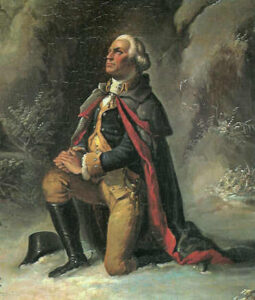
No English Bibles were printed in America prior to the American Revolution.87 England maintained a monopoly on this printing. With the war, America was cut off from its supply of Bibles. To remedy this, the Congress authorized a committee “to import 20,000 Bibles from Holland, Scotland, or elsewhere” on September 11, 1777, and in 1782 they officially approved and recommended the printing of an American edition of the Bible prepared by Robert Aitken, known as the Aitken Bible. Rev. John Rodgers suggested in a letter to Washington, May 30, 1783, that Congress present each soldier with an Aitken Bible. Washington replied that it was too late to act upon Rodgers suggestion since near two thirds of the army had already been discharged. “It would have pleased me,” Washington wrote, “if Congress should have made such an important present, to the brave fellows, who have done so much for the Security of their Country’s Rights and Establishment.”88
The public writings and letters of George Washington provide a mass of evidence in support of his Christian faith, character, and worldview. Throughout his life, and especially during the war, he acknowledged the hand of God and Providence, writing of needing His aid and recognizing that success depended upon Him.89 In proposing an attack on the enemy in the Revolutionary War Washington wrote: “The success of such an enterprise depends, I well know, upon the All-wise Disposer of events.”90 He relied upon God and his orders said others should do so as well.91 His most significant and widely read writings all have a strong declaration of his Christian faith and worldview. This included his Circular Letter to the Governors, June 8, 1783,92 his First Inaugural Address, April 30, 1789,93 and his Farewell Address, 1796.94
There was a great mutual respect between Washington and the clergy. His adopted son wrote: “The high respect in which the clergy of the American army was held by Washington was known to every officer and soldier in its ranks.”95 After Washington was elected President many churches and denominations wrote him letters of congratulation and support.96 This correspondence to and from him show his Christian faith. Their letters thank him his support of Christian liberty and the Christian faith. His replies, according to Sparks, “breathe a Christian spirit” and imply his belief “of the truth and authority of the Christian religion.”97
Washington supported Christianizing the Indians, for their benefit as well as the nation’s. In 1779 he wrote to the Delaware Indian Chiefs: “You do well to wish to learn our arts and ways of life, and above all, the religion of Jesus Christ. These will make you a greater and happier people than you are.”98 As President he wrote to the United Brethren for Propagating the Gospel among the Heathen saying it would be a good thing for the government to cooperate with the “endeavors of your Society to civilize and Christianize the savages of the wilderness.”99
In summary, Washington was a devoted church-goer all his life, yet not a sectarian. He did not write on his doctrinal beliefs, but his life and writings reflect orthodoxy. He regularly prayed in public and private, but never spoke of his private devotions. His adopted daughter wrote, “He was not one of those who act or pray, ‘that they may be seen of men.’ He communed with his God in secret.”100 Since he did not speak about himself on any personal matter, it follows he would not speak of his religious beliefs.
Sparks wrote that “to say that he was not a Christian, or at least that he did not believe himself to be a Christian, would be to impeach his sincerity and honesty.”101 After studying his life and writings extensively, Sparks said “that I have never seen a single hint, or expression, from which it could be inferred, that he had any doubt of the Christian revelation.”102
Arguments for Washington’s Deism
Some modern writers have made the claim that Washington was not a Christian, but a deist. They argue that he did not write of Jesus Christ, but used more general terms, thus he could not be a Christian. Yet, he wrote on June 12, 1779, to the Delaware Indian Chiefs: “You do well to wish to learn our arts and ways of life, and above all, the religion of Jesus Christ. These will make you a greater and happier people than you are.”103 He also wrote of “the Divine Author of our blessed Religion,” clearly speaking of Jesus, and calling Him “Divine.” Many of the 80 terms he used for God in his writings express the nature of the Christian Deity and His Son, not a deistic view of god.104 These also show he had a great knowledge of the nature of God. He words were not inconsistent with the Anglican/Episcopal tradition. Some Christians at this time felt it inappropriate to commonly use the specific name of deity.
Some also argue that Washington used deistic terminology, not Christian, for example referring to Providence as “it.” As stated above, Washington did use much Christian language throughout his life, including using many Biblical phrases. Much of his terminology was like that used by devote Episcopalians of the time, including ministers.105 Washington did use “it” at times for Providence, but since providence is “the superintending care of God over His creation,”106 then “it” is an appropriate way to reference this. Also, he used “He” many times when referring to the “Almighty Being,”107 “benign Parent,” and so on. In his Eulogy on Washington, Attorney Jonathan Mitchell Sewell observed: “Let the deist reflect on this, and remember that Washington, the saviour of his country, did not disdain to acknowledge and adore a greater Saviour, whom deists and infidels affect to slight and despise.”108
Another argument for his deism is that some say he did not take communion. While this appears to be true for part of his time as President (and the reason had nothing to do with lack of Christian belief, because, among many other things, he continued to faithfully attend church),109 he did take communion many times throughout his life. Many people have given testimony of this, including his granddaughter, Nelly Custis, who wrote that she heard her mother (Martha’s daughter) say “that General Washington always received the sacrament with my grandmother before the Revolution.”110
Some have also said that Washington had no minister at his death bed which showed his “true beliefs.” Yet, as stated earlier, he was sure in his faith and believed in the afterlife. There was also little time between his sickness and death. In addition, his actions of that day show he did not want to trouble anyone.111
If Washington was a deist, then we would expect some ministers of his day to point out this fact or express some doubts of his Christianity. They challenged the faith of other prominent Founders like Benjamin Franklin, Thomas Paine, and Thomas Jefferson, but not Washington.112
The arguments put forth by those claiming Washington was a deist are weak. His life, words, character, and action proclaim what his family and friends witnessed to: he was a sincere Christian believer. To say otherwise would require proof to the contrary.
- Old Churches, Ministers and Families of Virginia, Bishop Meade, Philadelphia: J.B. Lipincott Compnay, 1857, Vol. 2, p. 243.
- Maxims of George Washington; Political, Military, Social, Moral, and Religious, Collected and Arranged by John Frederick Schroeder, Chapter introductions by John P. Riley, Mount Vernon, Vir.: The Mount Vernon Ladies’ Association, 1989, p. 164.
- Maxims of George Washington; Political, Military, Social, Moral, and Religious, Collected and Arranged by John Frederick Schroeder, New York: D. Appleton and Company, 1854, p. 340.
- See for example, James Thomas Flexner, George Washington, The Forge of Experience (1732-1775), Boston: Little, Brown, and Co., 1965, pp. 243-245. Flexner references Paul F. Boller, George Washington and Religion (Dallas, 1963). Many other modern writers have looked to Boller’s work when presenting Washington’s faith. Others, like Joseph Ellis in His Excellency, George Washington give brief mention of his faith, saying he was at best a nominal Episcopalian. To support his view, Ellis says he used words like Divine Providence instead of God, he did not take communion, and he stood to pray. Yet, he did use God, Christ, and 80 other terms for God; he did take communion (though for a time while President he did not, though not because he denied the faith); and he took all kinds of positions to pray (many saw him on his knees, sitting and standing at meals, etc.).
- Many of the same people today muddle up the clear facts in our history regarding the central influence of Christianity in America’s foundation.
- See for example, A Nation Mourns: Bishop James Madison’s Memorial Eulogy on the Death of George Washington, Delivered February 22, 1800 in Bruton Parish Church, Williamsburg, Virginia.
- For example, E.C. M’Guire wrote: “The peculiar and excellent virtues distinguishing this favoured servant of God, could not be ascribed to any other source, than the grace of the Holy Spirit.” E. C. M’Guire, The Religious Opinions and Character of Washington, New York: Harper & Brothers, 1836, p. 404.
- See William J. Johnson, George Washington the Christian, reprinted by Mott Media, Milford, Mich.: 1976 (1919); E. C. M’Guire, The Religious Opinions and Character of Washington; Rev. John Stockton Littell, D.D., George Washington: Christian, 1913; Rev. Theodore Wm. John Wylie, Washington, A Christian, 1862; Michael Novak and Jana Novak, Washington’s God: Religion, Liberty, and the Father of Our Country, New York: Basic Books, 2006. Philip Slaughter, Christianity the Key to the Character and Career of Washington, New York: Thomas Whittaker, 1886.
- John Marshall, The Life of George Washington, Vol. 2, 1826, 1832, p. 445.; in George Washington, the Character and Influence of One Man, Verna M. Hall, compiler, San Francisco: Foundation for American Christian Education, 1999, p. 11.
- Washington, Maxims (1855), p. 367.
- Eulogies and Orations on the Life and Death of General George Washington, Boston: Manning and Loring, 1800, p. 37, from a eulogy by Jonathan Mitchell Sewall on December 31, 1799, in David Barton, The Question of Freemasonry and the Founding Fathers, Aledo, Tex.: Wallbuilders, 2005, p. 111; also in M’Guire, p. 358.
- Gunning Bedford, Funeral Oration, upon the death of General George Washington. Prepared at the request of the Masonic Lodge, No. 14, of Wilmington . . . Delivered on St. John the Evangelist’s day . . . and now published at the particular desire of the Lodge, Wilmington: James Wilson, 1800, p. 15, in Barton, p. 101.
- Writings of George Washington, Jared Sparks, editor, 1838, vol. XII, pp. 406-407. See also Sparks, 522.
- Henry Melchoir Muhlenberg, The Journals of Henry Melchoir Muhlenberg, Theodore Tappert and John Dobestein, translators (Philadelphia: Evangelical Lutheran Ministerium of Pennsylvania and Adjacent States, 1958), Vol. III, p. 149.
- Eulogy upon the Death of Washington delivered in Dinwiddie County Virginia, in M’Guire, p. 393. Meade, 2:245; Maxims, 367; Johnson, 256.
- Sparks, 523.
- E. C. M’Guire, pp. 141-142.
- Sparks, 492.
- Sparks, 525.
- Aaron Bancroft, The Life of George Washington, Commander of the American Army, Vol. 2, Conclusion, in Verna M.Hall, p. 12.
- William J. Johnson, George Washington the Christian, Milford, Mich.: Mott Media, 1976, originally printed 1919, pp. 166-167. [See GWP, Old South Leaflets.]
- Custis, p. 173.
- Some modern writers have said Washington missed church many times, saying this shows a lack of true Christian belief. They overlook the testimony of family and friends and fail to take into account the obstacles from weather and travel to make the trip to church each week.
- Sparks, 521.
- The Writings of George Washington from the Original Manuscript Sources, 1745-1799, (designated GWP in other footnotes) John C. Fitzpatrick, Editor, Washington: United States Government Printing Office, 1931, Vol. 37, pp. 484-485.
- The Diaries of George Washington, Vol. 3, Donald Jackson, editor, Dorothy Twohig, associate editor, Charlottesville: University Press of Virginia, 1978, pp. 280, 284, 285, 286.
- Johnson, p. 75.
- Johnson, p. 89.
- Sparks, p. 521.
- Custis, p. 508.
- See Custis, p. 171.
- Sparks, pp. 519-520.
- Bishop Meade, Old Churches, Ministers and Families of Virginia, Vol. 2, Philadelphia: J.B. Lippincott Co., 1857, p. 245.
- Letter to Colonel Benedict Arnold, September 14, 1775, GWP, 3:492.
- See Charity. Also for two examples, see GWP, 27:342, 30:467.
- See Johnson, pp. 288-291.
- GWP, 23:478.
- Johnson, p. 202.
- Johnson, p. 225.
- Kirkland, p. 356.
- Kirkland, p. 365.
- GWP, 27:317.
- See for example, GWP, 35:432; 35:447.
- GWP, 27:128.
- Letter to George Washington Parke Custis, November 15, 1796, in Custis, 74.
- Letter to G.W.P. Custis, March 19, 1798, Custis, p. 100. See also Letter of June 13, 1798, Custis, p. 106.
- For a list, see George Washington, The Character and Influence of One Man, a Compilation by Verna M. Hall, pp. 254-271.
- Johnson, pp. 23-35.
- Sparks, 523. See also B.F. Morris, Christian Life and Character of the Civil Institutions of the United States, Philadelphia: George W. Childs, 1864, pp. 501-502, for another testimony of Lewis.
- Johnson, p. 198.
- A Discourse in English by David Tappan, Hollis Professor of Divinity; Delivered before the University in Cambridge, Feb. 21, 1800. In Solemn Commemoration of General George Washington, printed by Samuel Etheridge, 1800.
- Custis, p. 509.
- Sparks, p. 522.
- Circular to the States, June 8, 1783, GWP, 26:496.
- Johnson, 231.
- The Diaries of George Washington, Vol. III, p. 254.
- Custis, p. 174.
- Custis, p. 173.
- M’Guire, p. 185.
- Meade, p. 245.
- See p. 61, Johnson.
- Custis, p. 398.
- Sparks, p. 545.
- M’Guire, p. 158.
- London Chronicle, Vol. XLVI, September 21-23, 1779, p. 228, quoted in William J. Johnson, George Washington the Christian, pp. 120-121.
- Johnson, 163.
- Joseph Jones, The Life and Ashbel Green, New York: Robert Carter and Brothers, 1849, 267.
- Custis, p. 435.
- The Diaries of George Washington, Vol. III, p. 254.
- Johnson, 144.
- GWP, 3:308.
- GWP, 27:227.
- Jones, p. 270.
- A Compilation of the Messages and Papers of the Presidents, Vol. 1, Published by Bureau of National Literature, Pursuant to an Act of the Fifty-Second Congress, 1897, p. 56.
- General Washington’s General Orders, Head-Quarters, New York, July 9, 1776, American Archives, Fifth Series, Vol. 1, 1776, Peter Force, published 1848, p. 226. See also GWP, 5:244-245.
- Kirkland, 237. Johnson, pp. 69-70.
- GWP, 4:369.
- GWP, 11: 245.
- GWP, 5:367. He issued similar orders during the French and Indian War, see Sparks, 519.
- Orders for May 26, 1777, in Johnson, p. 98.
- Orders for May 16, 1782, GWP, 24:260.
- General Orders, Saturday, March 22, 1783, GWP 26:250.
- GWP Custis, p. 376, 162.
- M’Guire, p. 138. Maxims, 377.
- Sparks, 278.
- See Benson J. Lossing, Mount Vernon and Its Associations, New York: W.A. Townsend & Co., 1859, p. 202.
- Bibles were printed in other languages. The first Bible printed in America was in the Algonquin Indian language,1660-63. Bibles were also printed in German.
- Letter to Reverend John Rodgers, June 11, 1783, GWP, 27:1.
- Many examples were given in section one of this book. For some examples during the war, see Washington’s letters to Trumbull, June 10, 1775; to Gage, July 18, 1775; to officers, Sept. 8, 1775; to Arnold, Sept. 8, 1775; to Reed, January, 1776; to Schuyler, Jan. 1776; to Reed, Jan. 1776; to Council of Massachusettes Bay, Feb. 1776; to General Assembly of Massachusettes, March 1776; to John Augustine Washington, March 31. 1776 and May 1776; Orders, July 2, 1776; to Schuyler, July 1776; to officers and soldiers of Pennsylvania, Aug. 8, 1776; to Armstrong, July 4, 1777; to John Augustine Washington, Oct. 1777; to Putnam, October 1777; to Carter, October, 1777; to Carter, May 30, 1778; to John Augustine Washington, July 4, 1778; to Nelson, August 1778; to Reed, Nov. 1778; to Harrison, Dec. 30, 1778; to Nelson, March 1779; to Reed, July 1779; to Gordon, March 1781; to Armstrong, March 1781; to President of Congress, Nov. 1781; to inhabitants of Alexandria, Nov. 1781; to the States, Jan. 31, 1782; Farewell to Army, Dec. 1783; to Congress, Dec. 23, 1783. There are many other examples in the war and throughout his life.
- Kirkland, p. 243.
- See Johnson, pp. 68, 69, 82.
- GWP, 26:496.
- See GWP, 30:291 ff.
- More will be found in Apostle of Liberty: The World-Changing Leadership of George Washington by Stephen McDowell.
- Custis, p. 290.
- For these letters see: GWP, 30:336, 339, 416, . . .; “Washington’s Addresses to the Churches,” Old South Leaflets, No. 65, Boston: The Old South Association.
- Sparks, p. 525.
- GWP, 15:55.
- Johnson, p. 169. GWP, 30:355.
- Writings, Sparks, 12:405-407; Sparks, p. 522.
- Sparks, p. 520.
- Sparks, p. 525.
- GWP, 15:55.
- For a list see Johnson, pp. 288-291 and Novak, Washington’s God, pp. 243-245.
- See A Nation Mourns: Bishop James Madison’s Memorial Eulogy on the Death of George Washington, Delivered February 22, 1800 in Bruton Parish Church, Williamsburg, Virginia, edited and with introduction by David L. Holmes, Mount Vernon: the Mount Vernon Ladies’ Association, 1999. Note that Madison’s religious terminology is similar to Washington’s, using Providence, and other non-evangelical words.
- See definition in An American Dictionary of the English Language, by Noah Webster, New York: S. Converse, 1828, facsimile edition published by Foundation for American Christian Education, 1980.
- For example in his First Inaugural Address; and he later uses “providential” in reverence to this.
- Eulogies and Orations on the Life and Death of General George Washington, Boston: Manning and Loring, 1800, p. 37, from eulogy given by Sewell on December 31, 1799.
- See Johnson, pp. 96-98.
- Johnson, 244. For others, see Sparks, p. 524; Meade, pp. 490-492; Johnson, pp. 58, 85-86, 89 ff, 194-195.
- See M’Guire, 353.
- It appears the minister of the church in Philadelphia he attended while President expressed some concern of Washington not taking communion, but did not make the claim he was a deist. Possibly the first minister to question his faith was Episcopal minister Bird Wilson in 1831. He said Washington was not a professor of religion, but he also said no President to that point had professed religion, which is not an accurate statement. Around this same time socialist Robert Owen also questioned Washington’s faith, but Owen had a definite agenda to attempt to change America from a self-governed republic to a socialistic “utopia.”


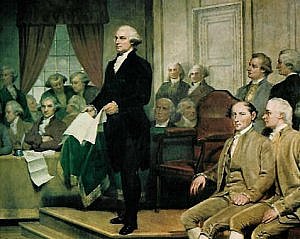

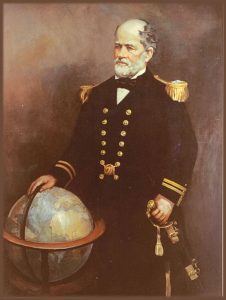 , including laying down lanes for steamers in the North Atlantic, 4) He developed the National Observatory, 5) He was instrumental in founding of U.S. Naval Academy, 6) He proposed the idea for a U.S. Meteorological Society or National Weather Bureau, 7) He was a key consultant for the laying of the transatlantic telegraph cable, 8) He invented the first floating mines and the first electric torpedoes, 9) He wrote many influential science books. Matthew Maury literally fulfilled the ancient mandate of God to take dominion over the earth (Gen. 1:26-28).
, including laying down lanes for steamers in the North Atlantic, 4) He developed the National Observatory, 5) He was instrumental in founding of U.S. Naval Academy, 6) He proposed the idea for a U.S. Meteorological Society or National Weather Bureau, 7) He was a key consultant for the laying of the transatlantic telegraph cable, 8) He invented the first floating mines and the first electric torpedoes, 9) He wrote many influential science books. Matthew Maury literally fulfilled the ancient mandate of God to take dominion over the earth (Gen. 1:26-28).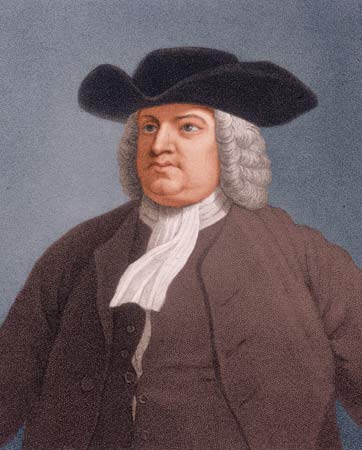

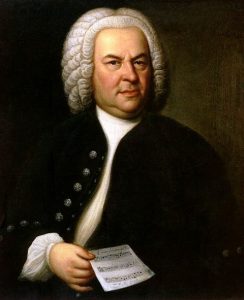 e refreshment of the soul.”
e refreshment of the soul.”